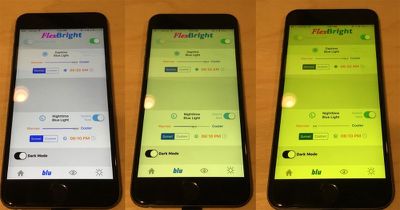Earlier this week, we shared a blue-light reduction app called FlexBright, which worked similarly to Apple's own Night Shift mode. Apple initially approved the app, which was able to adjust the screen temperature for the entire iPhone, but after it garnered attention following our post, Apple pulled it from the App Store.
FlexBright developer Sam Al-Jamal told MacRumors he had worked with Apple through several app rejections to get FlexBright into the App Store and that no private APIs were in use, something that was seemingly confirmed by the app's approval, but further review from Apple led to FlexBright's removal. Al-Jamal has shared Apple's explanation with MacRumors following an "exhausting discussion" with the Cupertino company. "The bottomline is [Apple] won't allow apps to change screen colors," he said.

Al-Jamal was given two technical reasons behind FlexBright's removal from the App Store. First, the app was using custom-created classes based on non-public APIs.
I recreated three classes based on non-public APIs. Even though these are custom classes that I created, but essentially they're using the same methods as in their non-public APIs.
Second, the app was using silent audio to keep FlexBright running in the background, a frowned-upon tactic that can result in battery drain. Late last year, the Facebook app for iOS was using excessive battery life, something caused in part by a silent audio component.
FlexBright masked the silent audio with a music player to "justify the background music activity," something that Apple approved twice even though the music playing function doesn't appear to work.
We labeled it as a new feature to "rest/close your eyes for few minutes and listen to some music". Now Apple says this is not the intended purpose of the app and they won't allow this approach.
Apple asked Al-Jamal to remove the blue light filter to get FlexBright back on the App Store, but he declined so that users who have already purchased the app can keep the feature. "For all intended purposes, FlexBright is dead," he said. He does plan to go on to make a new app that will detect eye fatigue based on screen brightness and time spent on an iOS device.
The developer behind FlexBright was using some questionable features to get the app to function, but its ability to slip past the App Store review process even through multiple rejections again puts a spotlight on Apple's inconsistencies and failures when it comes to reviewing apps. MacStories recently shared an in-depth look at the App Store review process, highlighting the problems and frustrations developers face, which rightly points out that the current review process is "harming the quality of apps on the App Store."






















